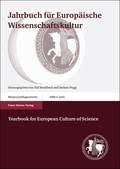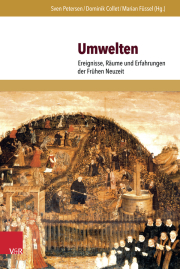Publications
October 15th, 2017
New Publication: Famine in European History
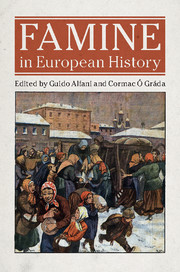
Dominik Collet and former research fellow Daniel Krämer have contributed a chapter on German-speaking Europe to the first systematic study of famines in all parts of Europe. The case studies range from Scandinavia and Italy to Ireland and Russia and compare the characteristics, consequences and causes of famine. The chapters also take full account of demographic, institutional, economic, social and cultural aspects, providing a wealth of new information which is organized and analysed within a comparative framework. Famine in European History represents a significant new contribution to all those who want to discover more about famines - truly horrific events which, for centuries, have been a recurring curse for the Europeans.
Dominik Collet / Daniel Krämer: Germany, Switzerland and Austria, in: Guido Alfani / Cormac Ó Gráda (ed.), Famine in European History, Cambridge 2017, p. 101-118.
More information here
August 15th, 2017
New publication
Famines occur at the interface of nature and culture, but are often studied in narrow, disciplinary settings. This volume documents the boundary-work undertaken by the research group. It brings together researchers from the sciences and the humanities to challenge deterministic approaches to human-environment interaction. Integrating the "archives of nature" with the "archives of man" it provides a fresh perspective on the entanglement of climate and culture in past societies.
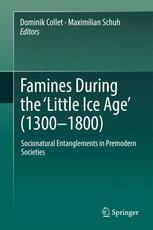
You can browse contents and order copies here.
For a review look here.
Dominik Collet and Maximilian Schuh. 2017. Famines During the 'Little Ice Age' (1300-1800). Socionatural Entanglements in Premodern Societies. Heidelberg: Springer.
July 12th, 2016
New publication
The materiality of knowing is analysed in a new volume, edited by Dominik Collet, Marian Füssel and Roy McLeod. Academic collections - spanning the arts, sciences, and medicine - have been a prominent feature of every university since their inception. But whereas the history of universities and the cultures of collecting have enjoyed a large and growing literature, the relationship between the two – the university of things – has remained strangely neglected. This interdisciplinary volume explores academic collections as agents of research, representation, application, and commodification. Through a selection of historical and contemporary cases, we examine the theory and practice these sites and their objects as a unique resource for an integrated history of science. The volume traced the university of things not just as a by-product or a handmaiden of scholarship, but as the material representation of practices that have helped shape the research university. Further information and abstracts of the essays can be found here.
Literature: Dominik Collet, Marian Füssel und Roy McLeod (eds.). 2016. The University of Things. Theory – History – Practice (Yearbook for European Culture of Science 8). Stuttgart: Steiner.
October 1st, 2015
New publication
This contribution analyses the evocation, framing and use of compassion in times of food shortages. It focuses on the European famine of 1770-72 where different emotional regimes intersected. Established rituals of consolation met with new ways of dealing with sentiment and emotion. In the Holy Roman Empire, Patriots and Menschenfreunde used the mobilisation of compassion to establish new forms of relief during the breakdown of local governance. With the help of the new genre of famine newspapers (Hungerzeitschriften) they acquired donations and initiated momentous shifts in welfare and education. Their evocation of compassion made emotions work at a distance and reveals the entanglement of feeling and acting in early modern societies.
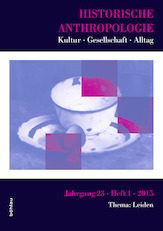
Literature: Dominik Collet, Mitleid machen. Die Nutzung von Emotionen in der Hungersnot 1770-1772. In: Historische Anthropologie. Kultur - Gesellschaft - Alltag 23 (2015), S. 54-69.
February 2nd, 2015
New publication
A new volume on environmental history coedited by Dominik Collet has just been published. This volume focuses on nature, religion and politics - three “environments” of early modernity.
Exemplary studies from pietism research, historical disaster studies, interdiciplinary environmental history and the history of transnational connectivity provide close-up insights into a plurality of lifeworlds and environments. Seen as a whole, these perspectives offer a broader understanding of early modern "environments" as material as well as cultural contexts of historical events and experiences, and encourage the crossing of the boundaries between established fields of research.
Literature: Sven Petersen, Dominik Collet, Marian Füssel (eds.). 2015. Umwelten. Ereignisse, Räume und Erfahrungen der Frühen Neuzeit. Göttingen: V&R Unipress.
For the publisher's discription see here![]() .
.
November 5th, 2014
New publication
Research on climate change is essentially a study of the past. However, while predicting future developments rests firmly on the analysis of historical changes, cooperation between climatologists and historians is extremely rare. Instead, the field is mired by disciplinary constraints and the resilient dichotomy of 'natural' and 'cultural' factors. Integrative approaches are only just beginning to emerge. Fewer still are empirical case studies that test the interaction of climate impacts and human responses in small-scale, high-resolution analyses. This paper tries to provide examples of both, drawing on the field of famine-studies. It presents the vulnerability-approach as an interdisciplinary boundary object for climate research, introducing the global famine of 1770–1772 as a case study. In this way, the paper makes the case for a genuinely historical approach in climate research to replace the current mode of simply ‘predicting the past.’
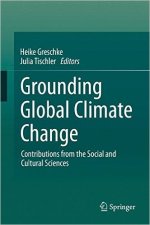
Collet, Dominik. Predicting the past? Integrating vulnerability, climate and culture during historical famines. In: Julia Tischler and Heike Gresche (eds.): Grounding global climate change. Contributions from the social and the cultural sciences. Dordrecht, 2014, S. 39-58.
Download the article here.
August 15th, 2014
New publication
Ruling Hunger. Socio-ecological entanglements of the First Partition of Poland and the European Famine of 1770-72
A new paper by the JRG Environment and Society studies the double, socio-ecological character of famines. Exploring the concurrence of the European Famine of 1770-72 and the First Partition of Poland (1772), the study traces the interactions between a crucial event of European history and an extreme weather anomaly. The environmental entanglement between the catastrophes of civil war and famine reveals the opportunistic appropriation of weather extremes by the parties involved. The observed plurality of human responses challenges deterministic models of human-environment interactions during extreme events.
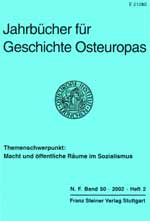 |
Literature: Dominik Collet, Hungern und Herrschen. Umweltgeschichtliche Verflechtungen der Ersten Teilung Polens und der europäischen Hungerkrise 1770-72. In: Jahrbücher für Geschichte Osteuropas 62.2 (2014), pp. 237-254. |
January 15th, 2014
New Publication
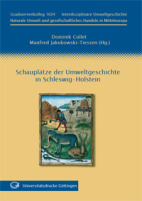
|
Collet, Dominik und Manfred Jakubowski-Tiessen (eds.) 2013. Schauplätze der Umweltgeschichte in Schleswig-Holstein. Göttingen: Universitätsverlag Göttingen. For the publisher's description see here |
May 1st, 2013
New Publication
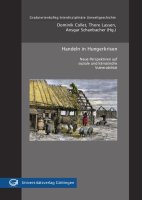 |
Collet, Dominik; Lassen, Thore and Schanbacher, Ansgar (eds.) 2012. Handeln in Hungerkrisen. Neue Perspektiven auf soziale und klimatische Vulnerabilität. Göttingen: Universitätsverlag Göttingen. For the publisher's description see here |


